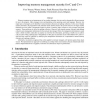Free Online Productivity Tools
i2Speak
i2Symbol
i2OCR
iTex2Img
iWeb2Print
iWeb2Shot
i2Type
iPdf2Split
iPdf2Merge
i2Bopomofo
i2Arabic
i2Style
i2Image
i2PDF
iLatex2Rtf
Sci2ools
131
click to vote
IJSSE
2010
2010
Improving Memory Management Security for C and C++
Memory managers are an important part of any modern language: they are used to dynamically allocate memory for use in the program. Many managers exist and depending on the operating system and language. However, two major types of managers can be identified: manual memory allocators and garbage collectors. In the case of manual memory allocators, the programmer must manually release memory back to the system when it is no longer needed. Problems can occur when a programmer forgets to release it (memory leaks), releases it twice or keeps using freed memory. These problems are solved in garbage collectors. However, both manual memory allocators and garbage collectors store management information for the memory they manage. Often, this management information is stored where a buffer overflow could allow an attacker to overwrite this information, providing a reliable way to achieve code execution when exploiting these vulnerabilities. In this paper we describe several vulnerabilities for ...
Related Content
| Added | 05 Mar 2011 |
| Updated | 05 Mar 2011 |
| Type | Journal |
| Year | 2010 |
| Where | IJSSE |
| Authors | Yves Younan, Wouter Joosen, Frank Piessens, Hans Van den Eynden |
Comments (0)

